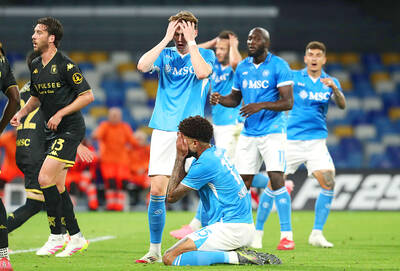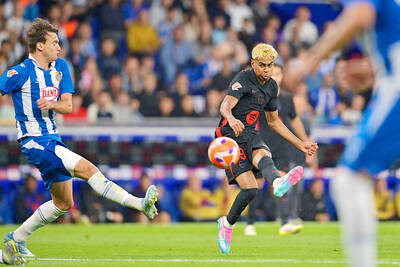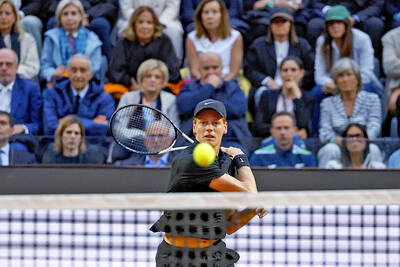Ariel Hsing was eight when she wrote down her Olympic dream on a piece of paper. She rolled it up, wrapped it with a string and tucked it into a small box.
“I said something along the lines of I wish to become an Olympian one day,” the 16-year-old Californian recalled. “Then for eight years, I convinced myself that if I opened the piece of paper and read it, my wish could not come true.”
She didn’t and it did.
Hsing will represent the US in table tennis at the London Olympics and she’ll be going with two other Californians who are even younger — 16-year old Lily Zhang and 15-year-old Erica Wu. The lone men’s representative will be Tim Wang of Houston, Texas.
Hsing has suddenly become a celebrity in a sport that gets scant attention in the US.
For starters, she is buddies with billionaires Warren Buffett and Bill Gates, close enough to call them “Uncle Warren” and “Uncle Bill.”
A table tennis buff, Buffett met Hsing when she was only nine and already a top youth player. Two years later, he invited her to play against shareholders at Berkshire Hathaway’s annual meeting. She has returned several times, including last month after winning a spot on the US team.
She faced both Buffett and Gates this time.
“Of course Uncle Warren and Uncle Bill have won points against me,” she said in an interview. “They’re actually pretty good, a lot better than the average person I would say.”
In an annual letter to shareholders, Buffett wrote of his first experience facing Hsing.
“The week I turned 75 I played Ariel, then 9 and barely tall enough to see across the table, thinking I would take it easy on her so as not to crush her young spirit. Instead she crushed me,” he said.
In an e-mail, Buffett said he had hoped to go see her play in London, but will be having treatment that week for prostate cancer.
Buffett said he was struck by Hsing’s “modesty, discipline, friendliness, and focus.”
Asked if he ever won a legitimate point off her, Buffett replied: “Perhaps one, but she set me up for it.”
Ariel’s father, Michael, has been juggling dozens of interview requests and one US television network is filming a documentary about her.
Despite the sudden fame, she sees herself primarily as a junior at Valley Christian High School in San Jose, California. She just attended the junior prom and her attention is on college entrance exams and a goal of being accepted at Stanford University to study business.
“I don’t think I’m famous at all,” she said. “People at my school recognize me. They say: ‘You’re the ping-pong girl.’”
Hsing offers insight into a game now ruled by Asians, and Chinese in particular. Americans in the 1930s and 1940s were briefly among the best, a period when central Europeans held sway.
Hsing developed a love of table tennis from her father, who emigrated 25 years ago from Taiwan, and her mother, Xin Jiang, who came to the US a bit earlier from China’s Henan Province.
They trained as computer engineers and Ariel said she started playing at seven, fetching balls for her parents in matches at a local recreation center.
“The first year I could beat her,” Michael said. “After eight, I could not.”
China have won 20 of 24 gold medals since table tennis entered the Olympics in 1988 and are expected to win all four gold medals when the London Games open on July 27. The five top-ranked players in the world — male and female — are all Chinese. Japan, South Korea, Singapore, Taiwan and Germany fill out the other top 10 spots.
Hsing is ranked No. 134, Zhang is No. 145 and Wu is No. 465. Wang is No. 381 on the men’s list.
With a population of 1.3 billion, China use their vast numbers and a Soviet-style sports school system to dominate the game, putting players through six hours of daily practice and winnowing the field as players grow older.
“For a lot of Americans, ping-pong is just a basement sport,” Hsing said. “It’s just a sport you play with family and friends and hit the ball around. In China, it’s the national sport. It’s kind of like the NBA.”
Hsing speaks Mandarin — “My English is better,” she said — and has spent several spells training in China. She knows what she’ll face in London. Part of the focus this time is getting experience and, perhaps, looking ahead to the 2016 and 2020 Olympics.
“Kids in China and kids in the US have pretty similar levels, but as they grow older the kids in China train professionally,” Hsing said. “Whereas kids in the US have to balance homework and school. So it gets harder. We train less. That’s where the gap starts to grow.”
Hsing practices with as many as eight coaches, each offering a little something different. Massimo Costantini is Italian, Stefan Feth is German and Dennis Davis is an American. Several others have roots in China, including former Chinese world champion Li Zhenshi, and Zhou Xin, who coached Hsing at the recent Olympic trials.
And the US national women’s team coach Teodor “Doru” Gheorghe, who is from Romania.
Previous US teams have featured Chinese American players born abroad. This time, the focus is on a generation born in the US.
Sean O’Neill, who played for the US in the 1988 and 1992 Olympics, said the sport has suddenly become cool, partly due to the table tennis club SPiN, co-founded in Manhattan by actress Susan Sarandon.
“It is no longer the Forest Gump, nerdy moniker we have to deal with,” said O’Neill, a spokesman for USA Table Tennis. “It is definitely one of the hip things.”
O’Neill used Zhang to point out a possible US rise in the sport. Zhang was ranked No. 2 in the world as an under-15 woman.
“We’ve never had that kind of international standing,” he said. “That being said, if China would put out 50 girls — they usually put out only two or three in this age group — Lily might have been No. 53. China has the depth that no other country can compete with.”
Ariel said her mother and father have tried to keep life normal and she tries to control the pressure with little tricks, like writing “Let’s Go, Have Fun” on her left forearm before big matches.
“I tend to put a lot of pressure on myself,” she said.
She quoted advice from her mother in the nervous weeks leading up to Olympic qualifying: “Ariel, why are you doing this to yourself? You don’t have to make it on your first try. You have 2016, you have 2020. You have so many more opportunities. It isn’t going to be the end of the world if you don’t make it.”
Her father likes to cite the family motto: “We focus on the process rather than the results.”

SSC Napoli’s Italian Serie A title hopes suffered a late setback on Sunday when they were held to a 2-2 draw at home against Genoa, setting up a thrilling season finale with closest rivals Inter just one point behind. The hosts remain top with 78 points, holding a slim lead over Inter, who won 2-0 at Torino earlier on Sunday, with two rounds remaining. To make matters worse for Napoli, midfielder Stanislav Lobotka, struggling with an ankle injury, was forced off just minutes after the match began. Scott McTominay delivered a perfect pass into the box where Romelu Lukaku got

A stunning Lamine Yamal strike on Thursday helped crown Barcelona La Liga champions with a 2-0 win over local rivals RCD Espanyol, with victory ensuring Real Madrid cannot catch them at the top of the table. Yamal’s effort and Fermin Lopez’s goal took Hansi Flick’s side seven points clear of Los Blancos with two matches remaining, to clinch Barcelona’s 28th title and complete a superb domestic treble. Only the UEFA Champions League title escaped an exciting young Barca side this season, as they won the league for the second time in six years, at Espanyol’s ground again just as in 2022-2023. Back then,

Jannik Sinner on Thursday marched into the semi-finals of the Italian Open after destroying Casper Ruud in straight sets 6-0, 6-1, while Coco Gauff won a marathon three-set battle with China’s Zheng Qinwen to advance to the women’s singles final. American Gauff is to face Italy’s Jasmine Paolini in today’s title match after pulling through 7-6 (7/3), 4-6, 7-6 (7/4) in a match that lasted over three-and-a-half hours. Ruud was supposed to be Sinner’s toughest test in Rome since he came back from his three-month doping ban, as the Norwegian came into the match in hot form on clay after winning in

Shohei Ohtani on Thursday delivered his first two-homer game of the season and had six RBIs as the Los Angeles Dodgers poured it on with five long balls in a 19-2 victory over the visiting Athletics. Max Muncy, Andy Pages and James Outman also hit home runs for the Dodgers, who left no doubt by taking a 13-2 lead following a seven-run third inning. Muncy and Kim Hye-seong each had three hits for Los Angeles. Dodgers right-hander Matt Sauer led off a bullpen game by allowing two runs in four innings. Left-hander Justin Wrobleski (1-1) finished with four scoreless innings after he